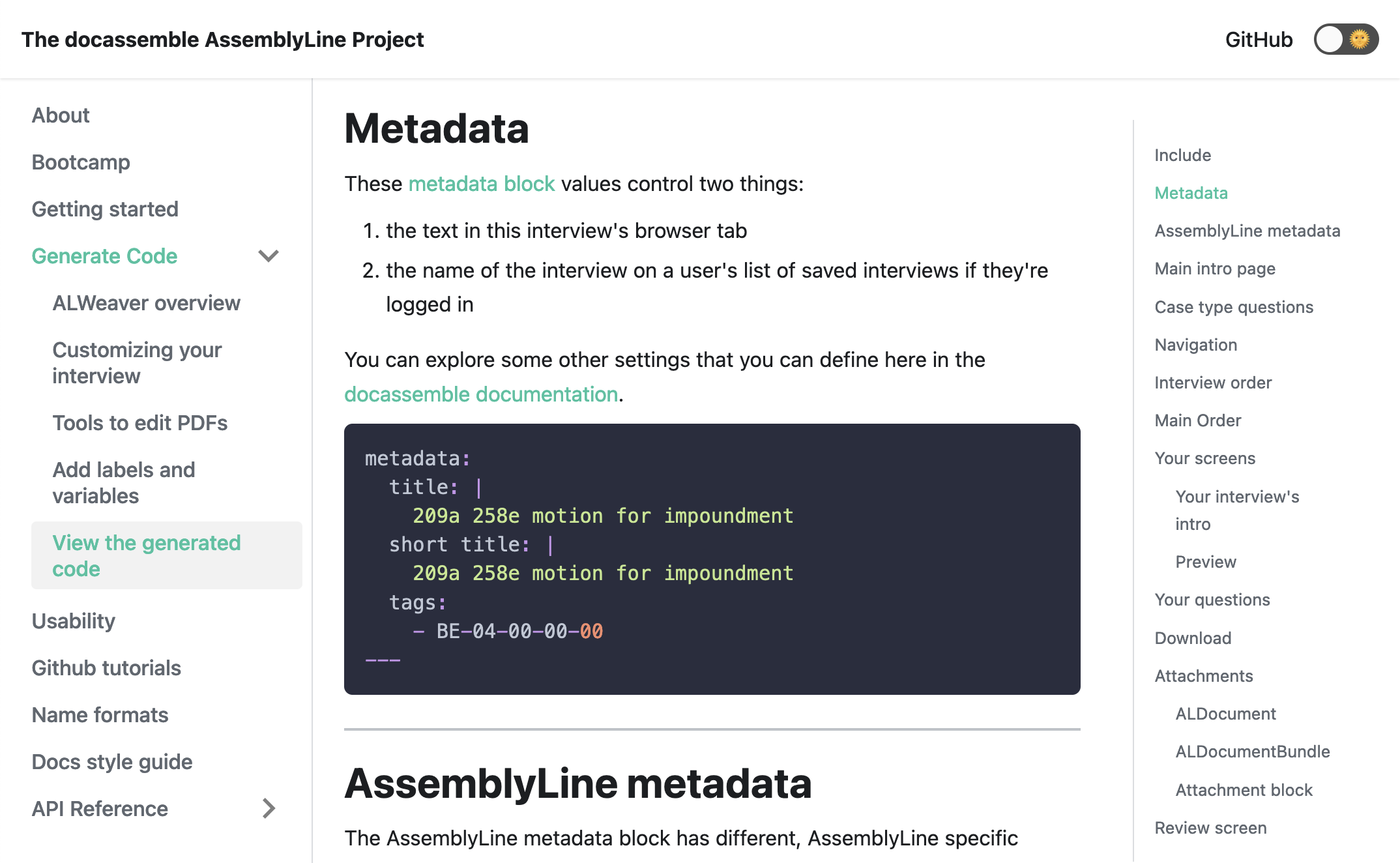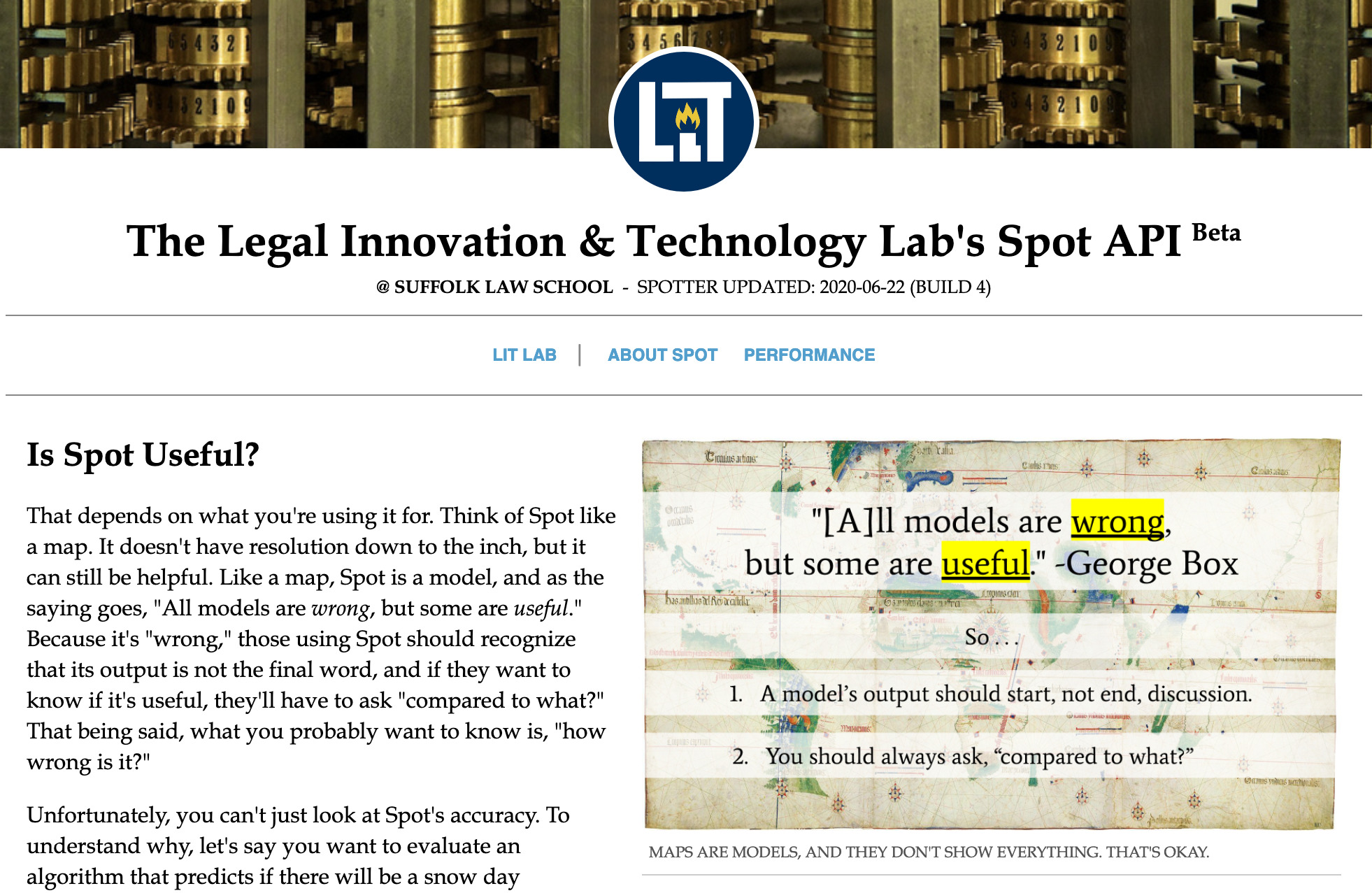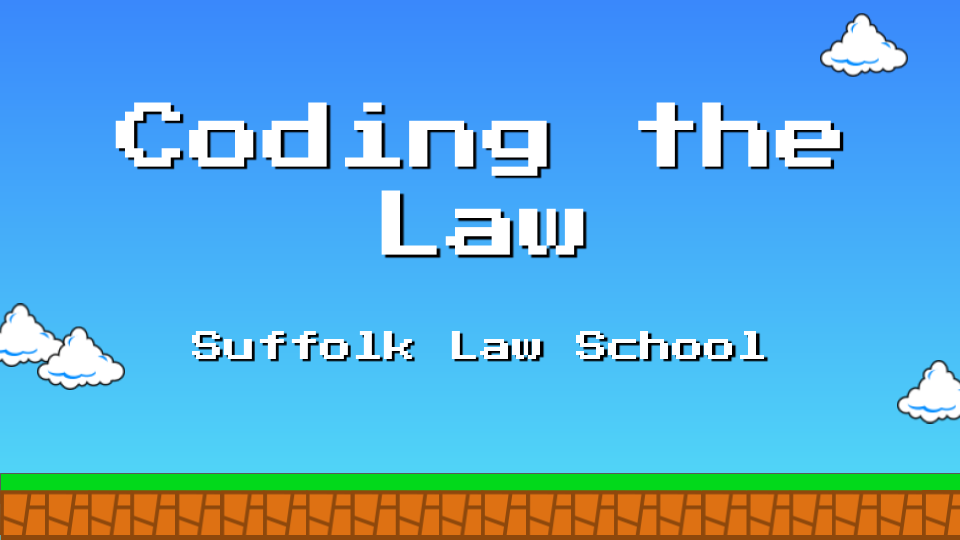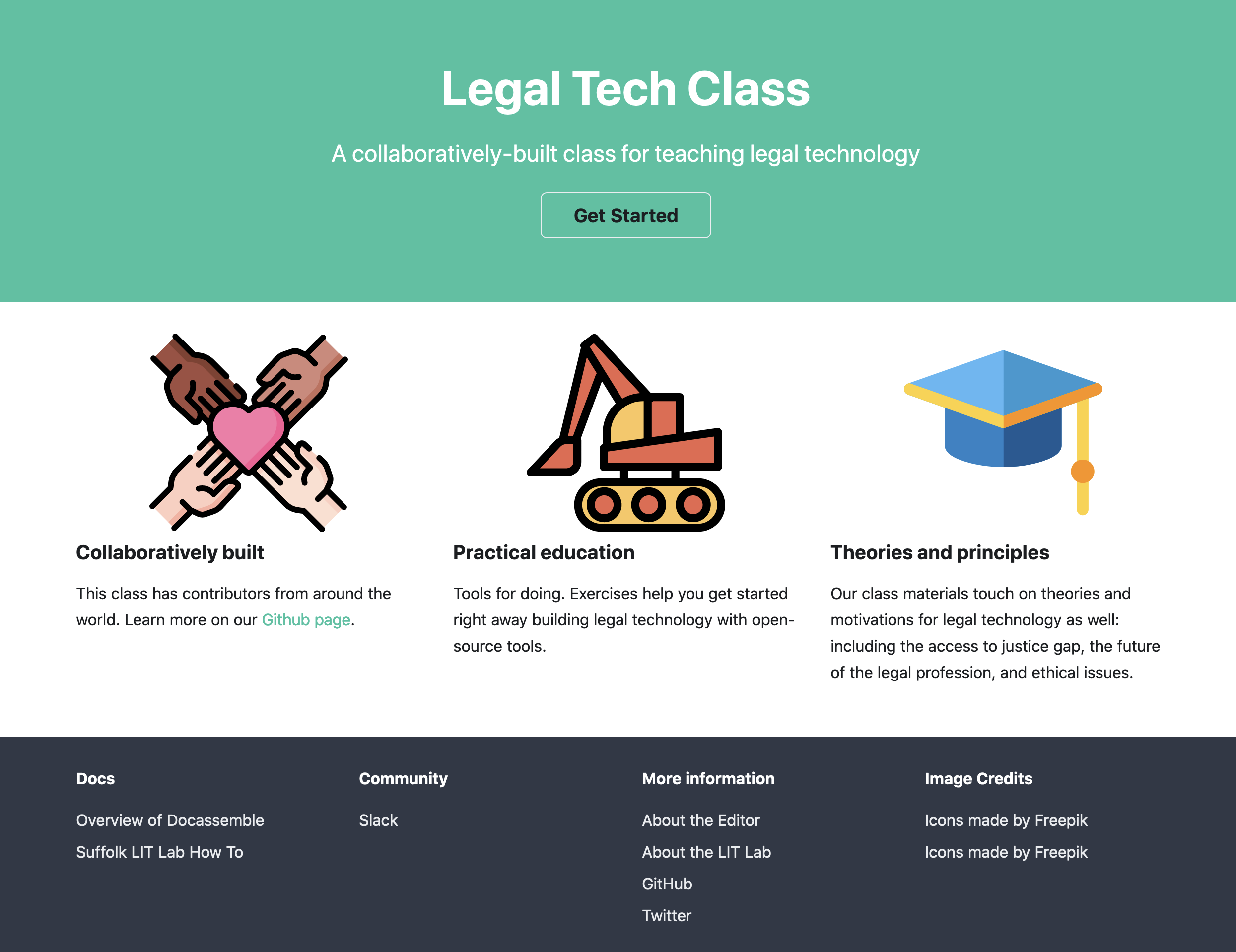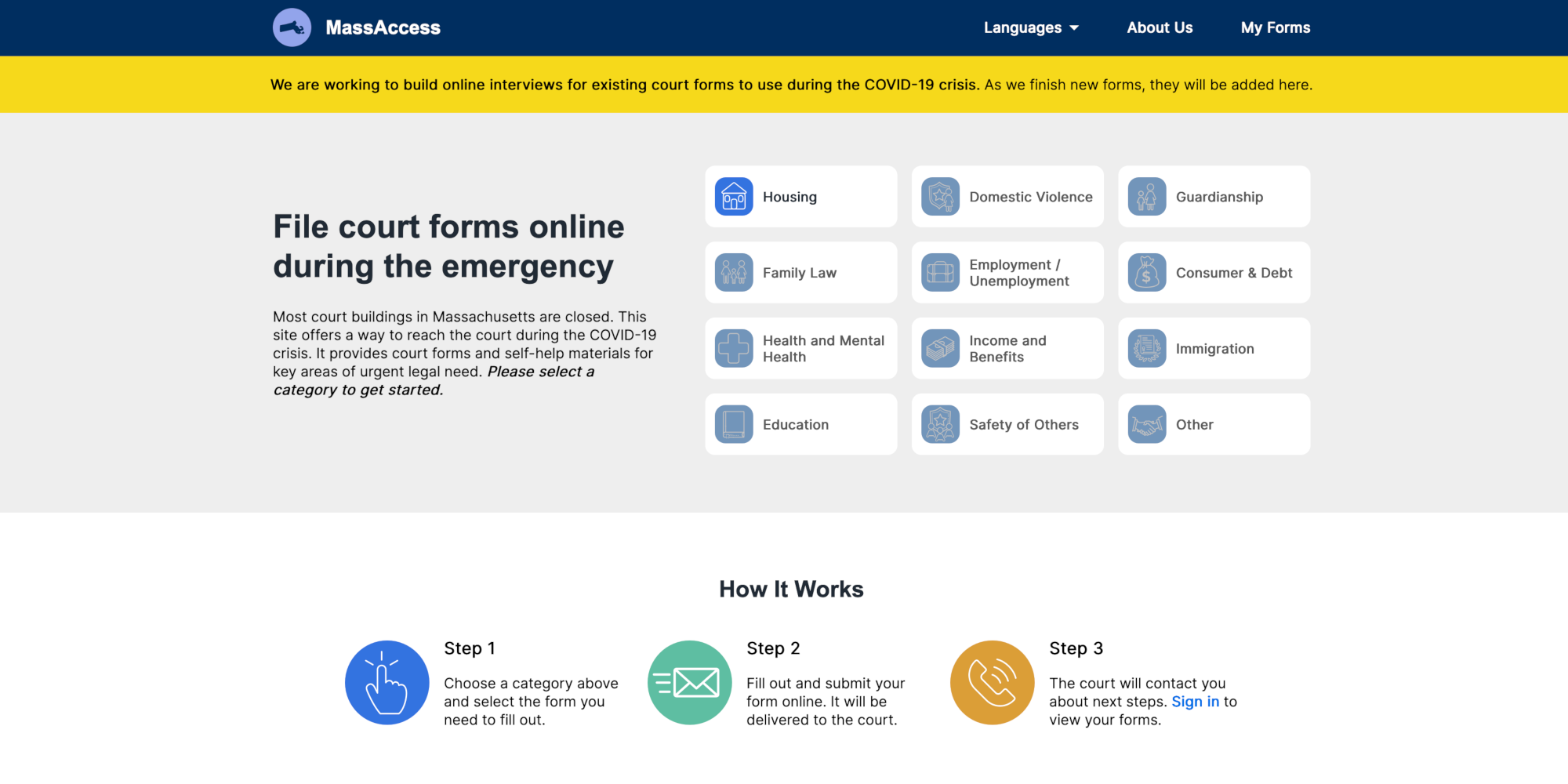Legal Innovation & Technology Lab@ Suffolk Law School
Select Projects
The following is a selection of Lab faculty, staff, and student work.
The Document Assembly Line
The Document Assembly Line project has produced a set of open-source tools and processes to help groups quickly and effectively create mobile-friendly online court forms and pro se materials. The documentation provided here aims to help groups adapt this work and create local versions of the assembly line.
Though we have focused on producing Massachusetts content at https://courtformsonline.org, we have built our tools with replicability in mind. Our novel code is released under an MIT License, and we have intentionally built on the open source docassemble platform.
Spot, an AI Issue Spotter
Spot is an issue spotter. Give Spot a non-lawyer's description of a situation, and it returns a list of likely issues from the National Subject Matter Index (NSMI), Version 2. The NSMI provides the legal aid community with a standard nomenclature for talking about client needs. It includes issues like eviction, foreclosure, bankruptcy, and child support. Spot is provided as a service over an API. Mostly, this means it's built for use by computer programs, not people. Coders can build things (like websites) on top of the API. The hope is that by automating part of issue identification, developers will use Spot to help people in need of legal assistance better access available resources.
Coding the Law
Learn how to think about technologies in the law by building your own. In this project-based course, open to non-programmers and coders alike, we explore the technical, legal, and ethical dimensions behind the use of computer algorithms by legal practitioners and the justice system. Projects range from the creation of simple document review and automation tools to the construction of expert systems and narrow AIs.
Legal Tech Class
The aim of this project is to create a collaboratively built "textbook" for teaching law school classes about legal technology. Currently, the class has contributors from around the world. Exercises help students get started right away building legal technology with open-source tools while touching on theories and motivations for legal technology—including the access to justice gap, the future of the legal profession, and ethical considerations.
Court Forms Online
File court forms online during the emergency.
A part of the Document Assembly Line project, this site offers a way for you to reach the court during the COVID-19 crisis. It provides court forms and self-help materials for areas of urgent legal need. Please select a category to get started.
Most forms are Massachusetts specific, but a few can be used across the United States.
Find My Cite
Are you a Zotero user? Do you ever wish you could search your libraries by ideas—not keywords? Then this page is for you. Find My Cite will help you download information from one of your group libraries and search it using an "idea" search. That is, it will match your search with the semantic content of text from your library. That means you don't have to use the exact language found in a text to find a cite.
Turn Spreadsheets into Flashcards
Serve and order a stack of virtual flashcards based on how well you've memorized its content. (1) make a spreadsheet with columns for the "front" and "back" of your cards; (2) add your content as rows to the sheet; (2) link that sheet to the web app; and (3) work your way through the cards.
Geography-based Youth Service Finder
When a juvenile is facing delinquency charges, courts often order youth to locate and participate in community programs as a condition of probation. Their ability to find and successfully participate in these programs can have long-lasting impacts on their sentences - and their futures. A constellation of social services exists for youths. These services, however, are offered by a variety of agencies, public and private, and make use of differing eligibility requirements. Additionally, access to such services is often dependent on physical proximity. Consequently, service discovery is a time-intensive process, and exhaustive exploration of services by youth and youth advocates is often impractical. For this reason, the lab is working on the creation of a tool that will allow users to filter service providers by location, age, and service type. Current thinking is focused on the creation of a map-based tool that allows users to search for and find relevant service providers as one might look for a restaurant an Yelp. Initially, this web application (website optimized to look good on a phone) will concern itself with service providers in the Boston metro area. However, the technology being used would allow for the expansion of this application to include expansion into more service types and areas. This will include documentation to help others create their own instances of the app.
Speaking the Same Language: Data Standards and Disruptive Technologies in the Administration of Justice
While the legal profession is coming to grips with technological disruption, practitioners serving the needs of those with low and moderate-incomes find themselves struggling to keep up. Insufficient resources clearly impede large scale technological improvements. Yet, the rise of civic coding and the growing legal technology sector suggest an untapped pool of civic and private resources ready to help address this shortfall. We argue that state trial courts are best positioned to leverage these resources for the benefit of low and moderate-income individuals by addressing a key structural impediment to innovation: the lack of clearly-defined judicial data standards.
A Progamming Language for Lawyers—QnA Markup
QnA is a markup language for people with little or no programming experience. It was designed with attorneys in mind and transforms blocks of text into interactive question and answer sessions (QnAs). These QnAs can be used as stand-alone expert systems or in the aid of rule-based document construction. Plus, they can be fun, and the entire project is open source.

